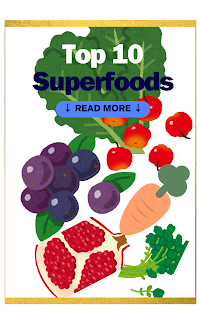Longevity is a growing industry, with countless trends promising to extend lifespan and improve health. However, many so-called "life-extending" methods are not supported by solid scientific evidence. In this article, we analyze scientifically backed strategies that have been proven to impact longevity, such as calorie restriction, muscle maintenance, and blood glucose control, while debunking common myths that fail to deliver real results.
Myth 1: Superfoods Provide a Significant Longevity Boost
Reality: A Balanced Diet Matters More
Superfoods like acai berries, goji berries, and kale are often marketed as key to a longer life. While they contain beneficial antioxidants and vitamins, no single food significantly extends lifespan. Instead, research supports a well-balanced diet rich in whole foods, lean proteins, healthy fats, and complex carbohydrates as a more effective approach to longevity.
- The Mediterranean diet, which emphasizes fruits, vegetables, fish, and olive oil, has been linked to reduced mortality risk.
- A study published in The New England Journal of Medicine found that adherence to the Mediterranean diet lowered the risk of cardiovascular disease by 30%.
Myth 2: Taking High-Dose Supplements Ensures Longevity
Reality: Over-Supplementation Can Be Harmful
Many believe that taking large doses of vitamins and minerals, such as vitamin C or resveratrol, will extend life. However, research suggests that excessive supplementation may have neutral or even harmful effects.
- A 2011 study in JAMA found that high doses of vitamin E were associated with an increased risk of prostate cancer.
- Supplementing beyond recommended daily values may not provide added benefits if a person already has a well-balanced diet.
Scientifically Proven: Calorie Restriction
Calorie restriction (CR), without malnutrition, is one of the most extensively researched interventions for lifespan extension.
- Studies in yeast, worms, rodents, and primates suggest that a controlled reduction in caloric intake reduces age-related diseases and increases lifespan.
- The CALERIE trial, conducted in humans, found that a 25% reduction in caloric intake improved biomarkers linked to longevity, such as insulin sensitivity and inflammation markers.
- Mechanism: Reduced calorie intake lowers metabolic rate, decreases oxidative stress, and improves cellular repair processes.
Practical Application:
- Intermittent fasting (IF) can mimic the effects of calorie restriction without the need for continuous food deprivation.
- Avoiding processed foods and refined sugars can naturally reduce caloric intake without compromising nutritional quality.
Myth 3: Cardio is the Best Exercise for Longevity
Reality: Strength Training is Equally or More Important
While aerobic exercise is beneficial for cardiovascular health, muscle maintenance plays a crucial role in longevity.
- Sarcopenia (age-related muscle loss) is a major risk factor for mortality.
- A study published in The American Journal of Medicine found that muscle mass was a stronger predictor of longevity than BMI.
- Strength training improves insulin sensitivity, bone density, and metabolic function, reducing the risk of age-related diseases.
Practical Application:blood glucose levels
- Incorporate resistance training at least 2-3 times per week.
- Focus on compound movements such as squats, deadlifts, and push-ups to engage multiple muscle groups.
Scientifically Proven: Blood Glucose Control
Chronic high blood glucose levels accelerate aging and increase the risk of diseases such as diabetes, cardiovascular disease, and Alzheimer’s.
- The ACCORD trial demonstrated that tighter blood glucose control reduced the risk of complications related to diabetes.
- Insulin resistance contributes to inflammation and oxidative stress, both of which are linked to aging.
- Low-glycemic diets, regular physical activity, and intermittent fasting can help maintain optimal glucose levels.
Practical Application:
- Reduce consumption of refined carbohydrates such as white bread, pasta, and sugary beverages.
- Increase fiber intake to slow down glucose absorption and maintain steady insulin levels.
- Engage in daily movement, even light activity such as walking after meals, to help regulate blood sugar.
Myth 4: Extreme Biohacking Will Extend Life Expectancy
Reality: Many Biohacks Lack Long-Term Human Data
Extreme biohacking methods like cryotherapy, hyperbaric oxygen therapy, and stem cell treatments are often marketed as life-extending tools. While some have potential, they lack long-term human studies proving they significantly increase lifespan.
- Cryotherapy may reduce inflammation temporarily but does not have proven longevity benefits.
- Hyperbaric oxygen therapy has been studied for wound healing but lacks evidence for extending lifespan.
- Stem cell treatments remain largely experimental, with safety concerns and ethical considerations.
Scientifically Proven: Sleep Quality and Longevity
Poor sleep is linked to chronic diseases, immune dysfunction, and cognitive decline.
- The Nurses’ Health Study found that individuals who consistently slept 7-8 hours per night had a lower risk of premature death.
- Sleep deprivation increases cortisol levels, contributing to chronic inflammation and metabolic dysfunction.
Practical Application:
- Maintain a regular sleep schedule and avoid blue light exposure before bed.
- Prioritize deep sleep by keeping a cool, dark, and quiet sleeping environment.
- Manage stress through mindfulness techniques like meditation to improve sleep quality.
True longevity is achieved through evidence-based practices, not trendy gimmicks. Calorie restriction, muscle maintenance, and blood glucose control are among the most well-supported strategies for extending lifespan. Avoiding extreme supplementation, prioritizing quality sleep, and engaging in regular physical activity further support long-term health.
The key to longevity is consistency, not shortcuts. Making small, sustainable changes backed by science is the most effective way to extend and improve life.
.png)





